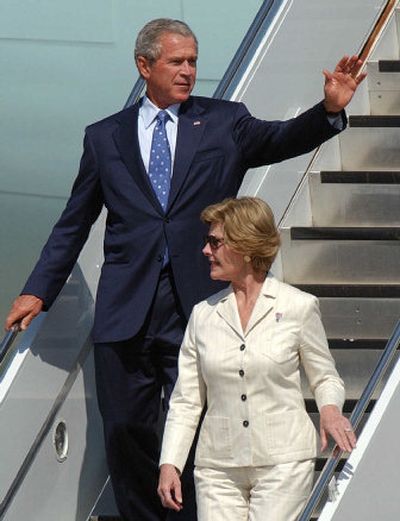Bush vacation ending early

CRAWFORD, Texas — This hasn’t been the most restful August for President Bush, and the rest of the year doesn’t figure to be a political picnic either.
The damage from Hurricane Katrina is the latest problem facing the president whose working vacation featured war protesters camped outside his Crawford ranch. As the devastation from Katrina grew clearer Tuesday, Bush decided to cut short his month-long vacation by two days and return to Washington to oversee the response to what the White House called “one of the most devastating storms in our nation’s history.”
Other challenges awaiting Bush include Social Security, taxes, stem cells, immigration, and a grand jury investigation into the news leak of a CIA operative’s name.
All this at a time when Bush’s approval ratings are at a low point, hovering around 40 percent.
“My guess is a lot of it is Iraq and some of it is gasoline prices,” said Charles Cook, publisher of a Washington-based political report.
With Congress scheduled to return to Washington next week, political analysts said John Roberts’ nomination to the Supreme Court could give the Bush team some political momentum. Roberts’ Senate confirmation hearings start Sept. 6.
They also said an effective hurricane response could help, or at least push down Iraq on daily newscasts.
The war dominated coverage of Bush’s recess. Cindy Sheehan, the mother of a soldier slain in Iraq, led the protest vigil, demanding a meeting with Bush.
The president declined, noting he has spoken with Sheehan and adding that they disagree about the war.
August also saw the development of a new proposed constitution in Iraq, though government leaders missed their deadline by almost two weeks and many Sunni Arabs opposed the final product.
But Bush aides still described it as progress toward a stable democracy.
An Iraqi referendum on the constitution is set for Oct. 15, though Bush and aides warned that insurgents might step up their attacks to disrupt the vote.
The anti-war movement, claiming momentum from its August vigil, plans to follow Bush to Washington, D.C. It is planning a major march and rally for Sept. 24.
Bush also faces the prospect of his first presidential veto this fall, over stem cell research.
A number of Senate Republicans have expressed support for an expansion of federally funded research into embryonic stem cells; Bush has vowed to veto any bill that permits the destruction of human embryos.
Some Republicans have also balked at other Bush initiatives, including a revamping of Social Security and an immigration bill that includes guest worker provisions.
There is also GOP nervousness about the U.S. death toll in Iraq.
The administration and its critics also await the outcome of a grand jury investigation. It focuses on the publication of the name of a former undercover CIA agent, the wife of a Bush critic.
Karlyn Bowman, who analyzes polling data for the Washington-based American Enterprise Institute, said “the numbers certainly don’t look good right now” for Bush, but he can reverse course if progress can be seen in the Middle East.
“Iraq is the story,” Bowman said. “All the other issues are secondary.”
With protesters camping out near the Bush ranch, advisers were particularly sensitive to the image of a president continuing to vacation amid the hurricane crisis. Bush’s father, President George H.W. Bush, suffered political damage when his administration was criticized for a slow response to the damage from Hurricane Andrew in Florida in 1992. The current president was quick to respond to four hurricanes in Florida last year.